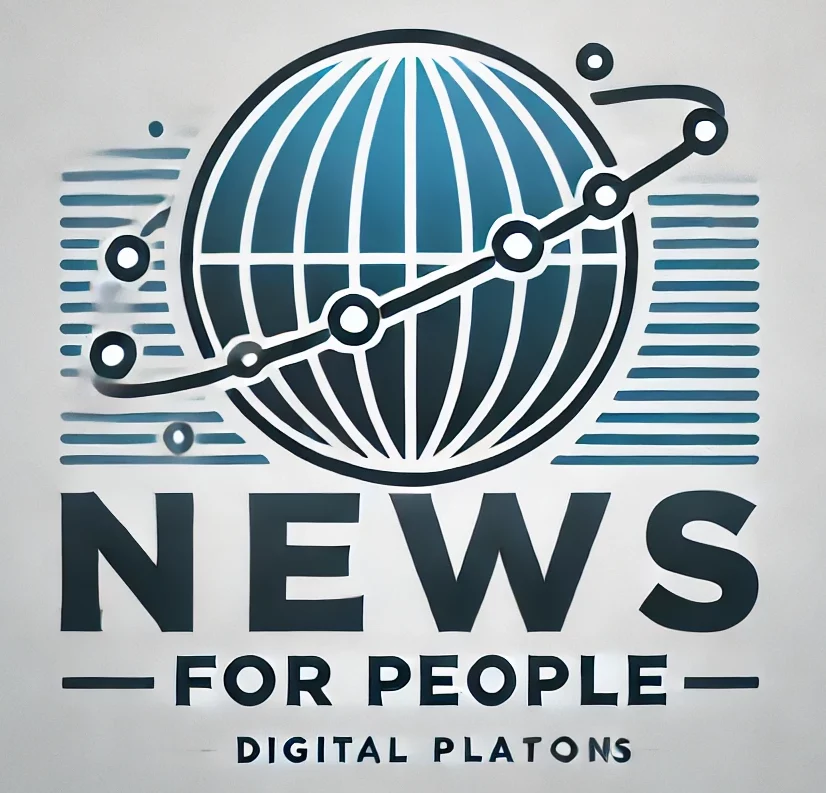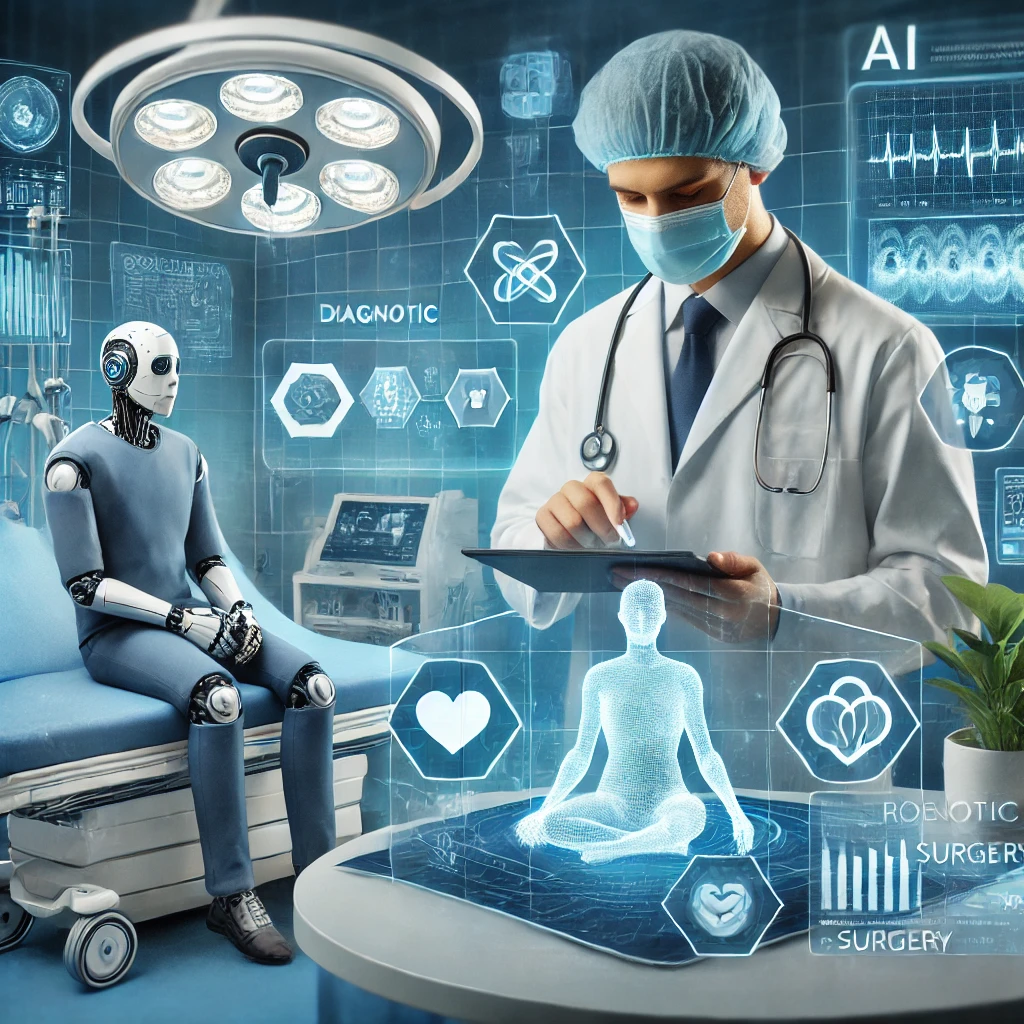Artificial Intelligence (AI) is rapidly transforming the healthcare industry, bringing about significant changes in how medical professionals diagnose, treat, and care for patients. This technology offers remarkable possibilities to enhance diagnostic precision, tailor treatments, and improve patient outcomes, all while boosting efficiency and cutting costs. From improving diagnostic accuracy to customizing care plans, AI is set to revolutionize almost every facet of healthcare.
This article delves into the ways AI is changing healthcare, particularly in diagnostics, treatment, and patient care, and discusses the future potential and challenges of this technology.
AI in Diagnostics: A Game Changer for Early Detection and Accuracy
Early detection is crucial for effective healthcare. The earlier a disease is identified, the better the chances of successful treatment. AI-powered tools are becoming essential in medical diagnostics, helping professionals spot conditions that might otherwise be missed, often with greater speed and accuracy than human clinicians.
Medical Imaging and Radiology
AI algorithms are greatly improving the accuracy of medical imaging, including X-rays, MRIs, and CT scans. For instance, AI can swiftly analyze medical images to detect tumors, fractures, and other abnormalities, assisting radiologists in finding issues that might be overlooked by the human eye. Some hospitals are now using AI systems to read chest X-rays and identify signs of pneumonia, tuberculosis, or lung cancer.
Deep Learning in Radiology: Deep learning models, which simulate neural networks in the brain, are enhancing the interpretation of radiological images. These systems learn from large datasets, improving their accuracy over time. AI tools like Aidoc and Zebra Medical Vision employ deep learning to analyze medical images and provide diagnostic insights, aiding doctors in making quicker, better-informed decisions.
Pathology and Lab Tests
AI is also advancing in the field of pathology, analyzing blood tests, biopsies, and other lab results. For example, AI can examine tissue samples for signs of cancer, identifying cellular abnormalities or mutations indicative of disease. By automating these processes, AI helps pathologists deliver more accurate diagnoses more swiftly.
AI in Genetic Testing: AI is being used to analyze genetic data, identifying genetic predispositions to certain diseases. This is particularly valuable in personalized medicine, where treatments are tailored based on an individual’s genetic profile.
Predictive Analytics
AI systems are being developed to predict the likelihood of diseases based on a patient’s medical history, lifestyle, and genetic factors. By leveraging big data and machine learning, these systems help doctors identify high-risk patients and intervene early.
For instance, AI tools can forecast the likelihood of a patient developing chronic conditions such as diabetes, heart disease, or stroke, facilitating early intervention and preventive care. IBM Watson Health has created AI models that analyze patient data to predict the onset of diseases like cancer, assisting doctors in making better treatment decisions.
AI in Treatment: Personalizing Care and Improving Outcomes
Beyond diagnostics, AI plays a vital role in personalizing treatment, ensuring patients receive the best care tailored to their unique needs. The ability of AI to analyze extensive patient data, including genetic information, medical history, and lifestyle, allows healthcare professionals to develop more precise and individualized treatment plans.
Personalized Treatment Plans
AI can help doctors design custom treatment plans based on a patient’s unique profile. By analyzing vast amounts of data, AI can suggest the most effective treatments for each individual, improving outcomes and reducing the trial and error often associated with medical care.
Drug Discovery and Development
AI is accelerating the process of drug discovery and development by predicting which compounds are likely to be effective against specific diseases. This not only speeds up the development of new drugs but also reduces the cost of bringing new treatments to market.
Monitoring and Support
AI-powered systems can monitor patients in real-time, providing continuous support and adjusting treatment plans as needed. This is particularly useful for managing chronic conditions, where ongoing monitoring and timely interventions are crucial for maintaining health.
Future Potential and Challenges
While the potential of AI in healthcare is immense, there are challenges to overcome. Issues such as data privacy, the need for high-quality data, and ensuring the ethical use of AI must be addressed. Moreover, integrating AI into existing healthcare systems requires significant investment and training.
In conclusion, AI is set to revolutionize healthcare by improving diagnostics, personalizing treatment, and enhancing patient care. As technology continues to advance, it will be essential to address the associated challenges to fully realize the benefits of AI in the medical field. # Precision Medicine
AI is revolutionizing precision medicine by customizing treatments for individuals based on their genetic makeup, lifestyle, and environment. This is a departure from the traditional method where treatments are uniform for all patients with a certain condition.
AI in Drug Discovery
AI is also speeding up the discovery of new drugs. Algorithms can process complex biological data to find potential drug candidates, predict their effectiveness, and even optimize clinical trial designs. Companies like Insilico Medicine utilize AI to identify promising compounds for diseases such as cancer, Alzheimer’s, and fibrosis, significantly reducing the drug development timeline.
Treatment Optimization
AI assists healthcare professionals in determining the best treatment plans. By analyzing patient data and clinical guidelines, AI tools can provide doctors with evidence-based recommendations tailored to individual needs. In oncology, for example, AI can help doctors choose the best chemotherapy or immunotherapy options based on a patient’s tumor profile.
AI-Assisted Surgery
AI-powered robotic-assisted surgeries are becoming more common in fields like orthopedics and neurosurgery. AI-driven robots help surgeons perform complex procedures with greater precision, reducing human error and improving surgical outcomes. The da Vinci Surgical System is one such platform that enhances a surgeon’s ability to conduct minimally invasive surgeries.
Managing Chronic Conditions
For patients with chronic conditions such as diabetes, heart disease, or asthma, AI can aid in monitoring and managing their health. AI-powered apps and wearables can track vital signs, medication adherence, and lifestyle changes, sending real-time data to healthcare providers. These systems enable continuous care and help prevent complications.
AI in Diabetes Management
BlueStar by WellDoc is a clinically proven, FDA-approved mobile app that leverages AI to manage diabetes. The app provides real-time feedback to patients based on their blood sugar levels and other factors, enabling personalized treatment and reducing complications.
AI in Patient Care: Enhancing Experience and Accessibility
AI is improving not just diagnostics and treatments, but also the overall patient experience. With AI tools, healthcare systems can streamline administrative tasks, enhance communication, and make healthcare more accessible, especially to underserved populations.
Virtual Health Assistants
AI-powered virtual assistants, like Ada Health and Babylon Health, are changing how patients access care. These assistants help with symptom checking, provide initial consultations, and offer advice on when to seek medical attention. They can also manage appointments, send reminders, and answer basic healthcare questions, enhancing system efficiency.
AI Chatbots for Mental Health
AI chatbots are also used to offer mental health support. For instance, Woebot is an AI-powered chatbot designed to help manage mental health by providing cognitive behavioral therapy techniques, mood tracking, and emotional support.
Telemedicine and Remote Monitoring
AI is crucial in the expansion of telemedicine, especially highlighted during the COVID-19 pandemic. With AI diagnostic tools, healthcare professionals can conduct remote consultations, reviewing symptoms and medical data to make diagnoses without physical exams.
AI-Enhanced Remote Monitoring
Wearable devices with AI can monitor various health parameters like heart rate, blood oxygen levels, and physical activity, playing a significant role in remote patient monitoring. AI and Real-Time Data Analysis in Healthcare
AI-powered systems have the capacity to process data instantly, enabling healthcare providers to identify potential problems before they escalate into critical situations.
3.3. AI Enhancing Healthcare Accessibility
AI is playing a significant role in making healthcare more accessible, especially in underserved and remote areas. Through virtual consultations and diagnostic tools, AI helps patients who lack easy access to healthcare facilities or specialists.
AI and Language Barriers: AI can also facilitate overcoming language barriers by offering real-time translation services, aiding healthcare professionals in communicating with patients who speak different languages. These AI translation tools ensure precise communication, enhancing care for non-native speakers.
4. Challenges and Ethical Considerations
Despite the vast potential AI holds, several challenges and ethical issues must be addressed. These include data privacy concerns, the risk of algorithmic bias, and the necessity for regulations to ensure responsible AI usage in healthcare.
Data Privacy: AI systems depend heavily on patient data, raising questions about privacy and security. It is crucial that these systems adhere to regulations like the Health Insurance Portability and Accountability Act (HIPAA) in the U.S. to protect patient information.
Bias in AI Algorithms: The effectiveness of AI systems is contingent on the data they are trained on. Biased training data can lead to flawed or unfair recommendations. Continuous efforts are required to ensure AI systems are trained on diverse and representative datasets.
Regulation and Oversight: As AI becomes more prevalent in healthcare, the need for clear regulations and oversight grows. Governments and regulatory bodies must create frameworks to evaluate the safety, effectiveness, and fairness of AI systems in healthcare.
5. The Future of AI in Healthcare
The future of AI in healthcare appears exceedingly promising. As technology advances, AI is expected to play a more substantial role in personalized medicine, improving patient outcomes, and transforming care delivery. AI advancements will also enhance healthcare efficiency, accessibility, and affordability, addressing many current system challenges.
AI-Driven Drug Development: AI’s future in healthcare could accelerate drug discovery, predicting the effectiveness of new drugs and expediting the development of life-saving treatments.
Enhanced Personalization: With the rise of genetic data and sophisticated AI algorithms, healthcare will become more personalized. AI will facilitate the creation of customized treatment plans based on an individual’s genetic information and lifestyle.
Conclusion
AI is not just an emerging trend in healthcare; it is already significantly influencing how we diagnose, treat, and care for patients. From enhancing diagnostic accuracy to enabling personalized treatment and improving patient care, AI has the potential to revolutionize the healthcare industry. Despite challenges like data privacy and algorithmic bias, the benefits of AI in healthcare are evident. As technology continues to progress, AI will increasingly drive the future of healthcare, leading to better care, improved outcomes, and greater accessibility for patients globally.

